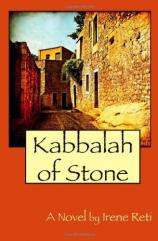Excerpt
Excerpt
Kabbalah of Stone

From Chapter Two of Kabbalah of Stone.
Eighteen centuries after Huldah’s vision on the Mount of Olives, on a rainy evening in Girona, Spain, the great rabbi Moshe ben Nachman, Nachmanides, sat in his study in the synagogue, which faced east toward Jerusalem. He was calculating the period between creation and redemption. “Each day of creation represents one thousand years of history,” he wrote in what later became his Book of Redemption. “I believe we near the seventh epoch, the generation when the Messiah will come.” Still young, Nachmanides was only beginning to conceive the texts that would distinguish him as one of the most renowned rabbis of all time.
As he mused on that blustery night, Huldah spoke from the spirit world through a crack in the wall. “Rabbi, you are not the first to think the end of times draws near, nor will you be the last. Obsessing about the Messiah is a dangerous distraction, which is why the rabbis in the Talmud warned: ‘May the bones be blown away of those who calculate the end.’ You, of all people, should know better. There is no map of creation, no predestined path."
Nachmanides peered into the blue light emanating from the crack in the building he called home. He closed his eyes to resist its pull. “I did write that in every Jewish year we begin again,” he answered. He was not surprised a spirit spoke to him, for he frequently encountered spirits in his meditations. But this outspoken female voice was new. “I distinguish between the ongoing creation through the fire of the Hebrew letters, in which there is no before or after, and the orderly unfolding of history, which will be completed with the resurrection of the dead. You have not understood my argument.”
“Your prophecy centers on the world of the human, on the history of the Jews, on human personifications of the Divine,” argued the voice. “Here in the foothills of the Pyrenees you live among bear and wolf, fig and oak tree, hawk and butterfly. Do you think an oak tree lives according to Jewish ideas of history, human notions of time?”
“Spirit, are you a pagan?” demanded the rabbi.
Outside, the rain grew heavier, but the spirit’s voice lifted over the pelting water.
“No. But like many men and women in Jerusalem before the destruction of the First Temple, I honored both Asherah and Adonai. We asked the Lady Asherah to bless us with children and with soft rains to water our crops. We kneaded dough and shaped it into round cakes for the Queen of Heaven, wove splendid garments, and draped them on her figure, which sometimes graced the Temple itself.”
“You speak of Asherah. How did you honor Adonai?”
“I taught Torah and the holy language in my school inside the southern gate of the Temple.”
“As a woman?” Nachmanides cupped his chin in thought. Something about the story this spirit told seemed familiar.
“There is much that might surprise you about your ancestors, Rabbi. Educated by my father and my uncle, I fell in love with the sacred texts. Most people could not read or understand the scrolls that were their heritage. I took it upon myself to teach them. However, I also loved Asherah. Adonai’s Torah as recorded by the priests speaks little of our love for the Divine Mother.”
Nachmanides rose from his chair to peer into the fissure from where this candid female voice spoke. “How did you come to be in the wall of my synagogue?”
“The Romans shipped some building blocks of Jerusalem across the sea. They used a few to construct Girona, including this holy building in which you pray, study, and teach. My spirit lives in these stones, though I sometimes travel beyond them.”
He needed to be sure that this was not a demon. “What is your name, Spirit?”
“They called me Weasel.”
She had never been pretty. Her neck was too long, her nose pointy, her ears small and rounded, her eyes black against her white face. Her mother had named her Weasel.
“Does this name trouble you?” her students had asked.
“No, it is a gift from heaven,” she had told them. “A weasel is clever and fearless and burrows beneath the everyday surface of things. Weasel is a good name for a prophet.”
Nachmanides’ quick mind scrolled to the correct passages in the book of Kings and the book of Chronicles. Like all rabbis of his time he knew the texts by heart. “Huldah?” he asked in wonder. “I thought you advised King Josiah to destroy Asherah.”
Kabbalah of Stone
- paperback: 292 pages
- Publisher: Juniper Lake Press
- ISBN-10: 0984319603
- ISBN-13: 9780984319602


